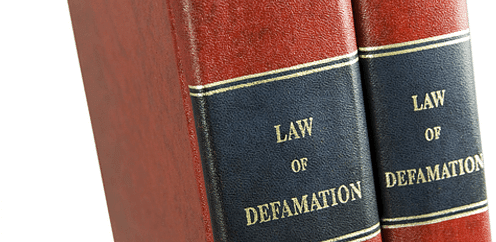In the last few months, there have been a spate of criminal defamation cases filed, notably against media houses. The use of criminal law against loss of reputation has a chilling effect on free speech.
In a democracy, do we need harsh criminal law over civil remedies against defamation? We bring you sharp perspectives.
India should join the growing list of countries that have outlawed criminal defamation
 Apurva Vishwanath
Apurva Vishwanath
Special Correspondent, ThePrint
Criminal defamation is nothing more than a tool of intimation buried in our statute books from the colonial times. The law gained more notoriety after the apex court ruled it to be constitutional and elevated the so-called right to reputation to the stature of a fundamental right.
When courts (as Justice Dipak Mishra, in the Subramaniam Swamy v Union of India, wrote) define reputation as “fundamentally a glorious amalgam and unification of virtues which makes a man feel proud of his ancestry and satisfies him to bequeath it as a part of inheritance on posterity,” do we need the state to protect it?
Loss of reputation is not a crime against the society. For a private wrong, loss of reputation, the law allows use of state machinery to impose criminal sanctions.
Unfortunately, in our country civil defamation to compensate loss of reputation is just an add-on to a criminal case that drags on for years. Here’s proof: Jay Amit Shah filed a criminal defamation case in an Ahmedabad court before filing a civil defamation suit seeking compensation.
In a democracy where free speech is guaranteed to ensure among other things free political participation, criminal defamation has no place. Earlier this year, Kenya joined the growing list of countries that have outlawed criminal defamation. High time, India did too.
Criminal defamation law is a needless colonial hangover that harms free speech
 Alok Prasanna Kumar
Alok Prasanna Kumar
Senior Resident Fellow at Vidhi Centre for Legal Policy
There is no reason for the existence of a criminal penalty for defamation. It is a needless colonial hangover that not only does not serve the purpose of deterring those spreading malicious falsehoods, but also actively harms free speech in India because of its chilling effect. Even though conviction is usually rare, the process itself is usually the punishment thanks to the massive problems in our judicial system.
The existing civil defamation law, however, is based entirely on the common law: developed on a case by case basis, and uncodified, and therefore, suffers from the vice of uncertainty. It is also prone to misuse as influential parties harass those working in the public interest through vexatious and expensive litigation. The most disturbing recent trend is of litigants obtaining ex parte injunctions against publishers for content by simply alleging defamation. Here too, even if the ultimate claim is not made out, the process itself turns out to be ruinous for the defendant.
I believe the proper remedy to the situation can be found in the Protection of Speech and Reputation Bill piloted by Lok Sabha MP Tathagatha Satpathy, which I had a chance to offer some inputs to in the drafting stage. I believe this Bill proposes the right remedy – balancing free speech with the need to protect reputation of individuals. It provides guidance to courts on how to adjudicate such matters and, more importantly, creates sufficient procedural safeguards to limit scope for abuse.
Civil defamation law is abused as cases are filed in remote places and exaggerated damages are claimed
 Apar Gupta
Apar Gupta
Advocate, free speech and privacy campaigner
Nothing illustrates the need for India to reform its speech laws more than defamation. Today defamation law is in disarray and is illustrated by its abuse and as a threat and not as a credible remedy to repair reputations.
This is principally because of the reliance on the criminal remedy of defamation, given a civil remedy is not fixed in statute and is perceived to be a “weak” remedy. Hence, in most defamation cases, a criminal complaint is filed and then a defendant is made to participate in a trial which lasts for years. A civil remedy is resorted to prevent immediate republication and wider circulation.
While there exists a certain consensus against criminal defamation, it’s deletion cannot exist in isolation. The law has an obligation to provide a remedy in civil law that is balanced, effective and, in principle, fulfils the objective of safeguarding reputations as well as a reasonable exercise of free speech.
Many abuses exist in civil defamation cases which are filed in remote places which have no connection with either the alleged victim or the author or publisher of the statement. Another tactic is exaggerated damages in which hundreds of crores are claimed. In time, greater ingenuity has been displayed with multiple cases by proxies being filed all over India. Many of these stratagems are based on a cynical exploitation of the inherent delays in India’s judicial system.
A first attempt at legal reform has been made by a private members bill termed as the Protection of Speech and Reputation Bill, 2016 that draws from the best practices across the commonwealth. It decriminalises defamation and also consolidates the civil law making it effective and also preventing its abuse. The existing law of defamation in India is broken and caters neither to the needs of victims nor authors, speakers or publishers.
Criminal defamation law is a professional hazard
 Raman Kirpal
Raman Kirpal
Managing editor, Newslaundry
Criminal defamation is a British legacy and the rich guys imbued with feudal spirit love to carry on with it. It’s a ‘toy’ law in their hands to intimidate ones who dare to challenge their authority. And the media is its worst target.
For 23 years, I have been engaged in one such war. I had written an interview of an IAS officer, who was the Muzaffarnagar DM then in 1994. He disputed the interview and the UP government filed a criminal defamation case on his behalf against me, my editor and the publisher. We managed to get his case dismissed.
The ordeal was, however, did not get over. He filed another criminal defamation in his individual capacity. He paraded his four fellow IAS officers as witnesses to claim that I had defamed him. The lower court decided in his favour and my editor, the publisher and I were declared convicted.
We never went to jail because it is a bailable offence. But for 24 years, I have been fighting a lonely battle. I have travelled countless number of times to Lucknow. The case will perhaps go on till I die. He managed to harass me, more so because my organisation didn’t monetarily support me in fighting the case. Only Shekhar Gupta, my editor in The Indian Express, helped me by sponsoring my travel and legal help, despite the fact the story for which I faced litigation was published elsewhere and not in the Indian Express.
How did the publication of an interview defame him and turn me into a criminal? This officer has moved up the ladder and is a secretary-level official in the central government. And I am a neo-criminal who has to seek the court’s permission to get my passport renewed and can travel abroad only with the court’s permission. A professional hazard, I suppose.
Tighten the provisions to prevent the law from being subverted by the powerful
 Aditya Singh Chawla
Aditya Singh Chawla
Research Analyst, Centre for Communication Governance, National Law University
In India, defamation is both a civil and criminal offence. The remedy for the former can be found in tort law, and for the latter, in Sections 499 and 500 of the Indian Penal Code.
While the preservation of the right to privacy and the right to reputation are important considerations, the deficiencies in the law can adversely affect freedom of speech and expression to a disproportionate degree. For instance, we’ve recently witnessed an unfortunate rise in the number of SLAPP suits – Strategic Lawsuits Against Public Participation. These are cases where deep pocketed individuals pursue defamation cases against their critics as a way to intimidate and silence them. These are usually large corporates dragging journalists to court for unfavourable reportage, but can also be powerful people trying to deter victims of sexual assault from speaking out.
Criminalising defamation is a disproportionate incursion into the freedom of speech. The offence involves no elements which justify the deprivation of the freedom of movement and of liberty. Art. 19(2) of the Constitution specifically allows reasonable restrictions to free speech in the interest of prevention of defamation. However, this ‘reasonableness’ also demands a relationship of proportionality between the restraint on free speech, and the corresponding countervailing interest. Though the Supreme Court has held the contrary in Subramanian Swamy v. Union of India, it is widely considered that penal consequences for what is ultimately a private wrong do not qualify this standard.
Civil defamation should be sufficient to address the harm caused, but is also in urgent need of reform. There need to be heightened standards for intent and harm for statements regarding public figures. We also need more clarity on what those categories mean. The aim should be to tighten the provisions in order to prevent the law from being subverted by the powerful towards their own ends.
Strengthen civil libel law; Abolish criminal defamation law, which is an instrument to harass genuine journalists
 Shekhar Gupta
Shekhar Gupta
Editor in Chief, ThePrint
Good journalism needs a good law of defamation. It can enhance our freedoms. It gives citizens who might feel aggrieved by the us a sense that they have a redressal. Problems arise when either the law is too weak, as in India, or too strong as it now seems in Britain, or when you have something totally outrageous like criminalised defamation.
In India, we have the worst of all worlds.
It is impossible for a victim of bad journalism or plain mudslinging to get justice — because the courts take too long, the law is weighed heavily in favour of the journalist. Judges tend to be forgiving, which is a good thing for us. So the plaintiff concludes that the only way she can get redressal is by filing criminal defamation. If nothing else, journalists have to appear in court three or four times, to take bail, to be read their charges, to enter the plea of being not-guilty and then, if it lasts long enough, face the rigours and expense of a criminal trial.
It is time to abolish the criminal defamation law. It has no relevance now. It is only an instrument of harassment of genuine journalists. Nobody should be sent to jail for defamation.
But people also have a right to protect their reputation. The law of civil defamation must be made stronger and fairer to plaintiff. It is too weak now, the process takes too long and you rarely hear of damages being awarded.
Globally, journalists are now seen seen as arrogant and unaccountable. The perception that there is no redressal must not grow, or public opinion will demand a government-appointed ‘autonomous’ body to monitor and control the media. It will be a disaster.
Disclosure: I speak as somebody who has handled defamation of both kinds, stood in courts around the country for bail, and have also (with my newspaper) once sent a defamation notice. Good news: it was amicably settled out of court).



